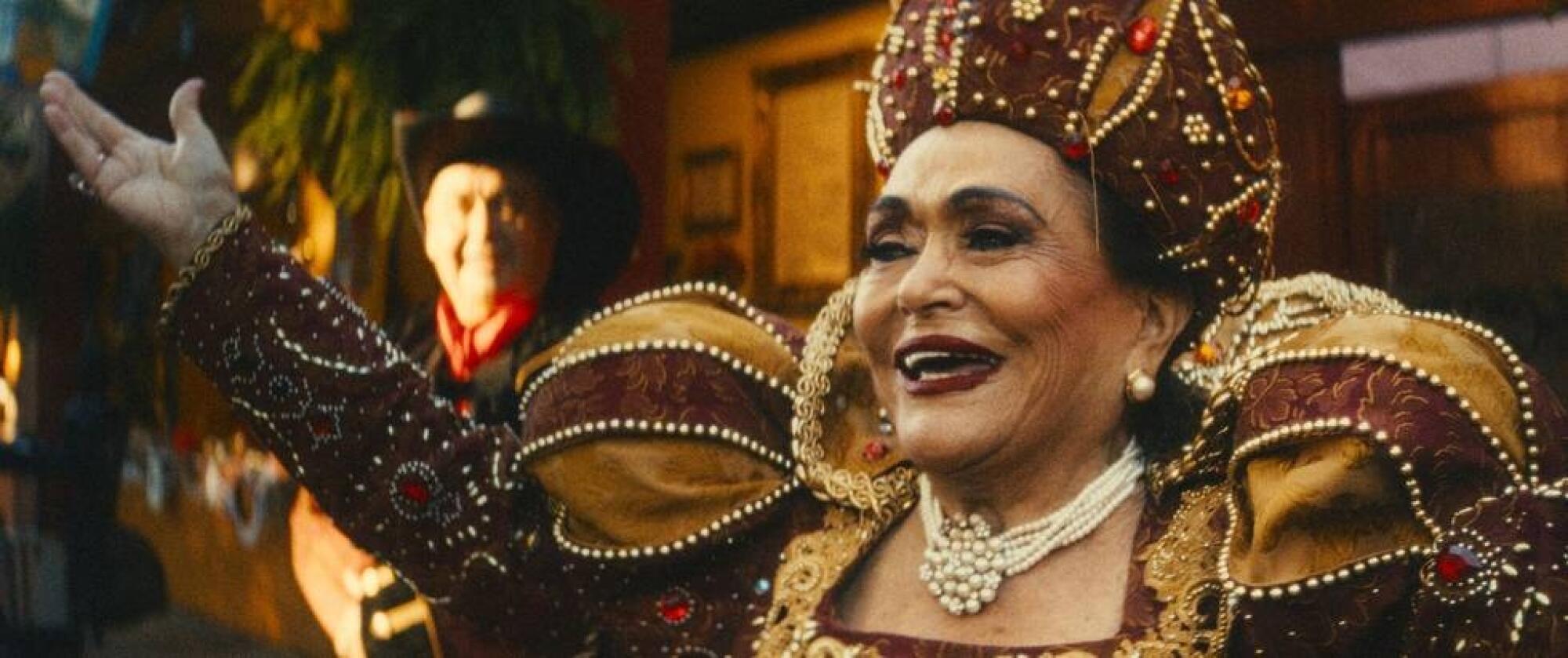When Oscar winner Alex Gibney despatched HBO Documentary Movies executives an early minimize of his new film, “Wise Guy: David Chase and the Sopranos,” he was blindsided by the suggestions he acquired.
“God bless HBO, they said, ‘This is so good — make it longer.’ I rarely get that note.”
Within the streaming world, documentaries have exploded, with newcomers like Netflix and Hulu chasing the subsequent binge-worthy sensation. However HBO Documentary Movies, which began in a nascent type within the late Seventies, stays a distinguished participant, thought to be an particularly prestigious and director-driven dwelling for nonfiction fare. To grasp why, it helps to speak to filmmakers who’ve just lately labored with HBO — together with Gibney, whose two-part documentary chronicles each Chase and his groundbreaking collection throughout a sweeping canvas.
David Chase in “Wise Guy: David Chase and the Sopranos.”
(HBO)
“I have a hard time making short docs,” jokes Gibney, whose 2023 MGM+ documentary “In Restless Dreams: The Music of Paul Simon” stretched 3½ hours. (“Wise Guy,” initially two hours, is now roughly that size.) “But [HBO] said, ‘You’ve got all this great stuff. You should lean into this and that.’”
Many administrators echo this appreciation for the liberty HBO affords them to do what they need in a business house typically dictated by algorithms and home types.
For Matt Wolf, the person behind “Pee-wee as Himself,” about Paul Reubens and his alter ego Pee-wee Herman, it was essential to craft a nuanced portrait. “We had a lot of autonomy and made the film very independently,” Wolf says, “until we were at the postproduction stage, when HBO became vital partners,” alluding to Reubens’ stunning 2023 dying, which revealed that the performer had privately been battling most cancers.

Paul Reubens in “Pee-wee as Himself.”
(Michael Ochs Archives / Getty Photos)
Nonetheless, HBO provides its filmmakers loads of notes — and has from the beginning. In 1979, Sheila Nevins was employed to run the channel’s burgeoning documentary programming, ultimately changing into president of HBO Documentary Movies. “Back then, HBO was a haven to make these really cool films,” remembers Oscar-nominated director Nanette Burstein, who first labored with Nevins as a co-writer and editor on 1995’s “Before You Go: A Daughter’s Diary.” “Sheila was the queen, and she was great at it. She gave pointed notes: ‘This is what I think should happen.’”
In 2019, Nevins left HBO for MTV Documentary Movies, however Burstein, whose HBO documentary “Elizabeth Taylor: The Lost Tapes” recontextualizes the Hollywood legend by way of a never-before-heard interview, credit present heads Nancy Abraham and Lisa Heller, together with Senior Vice President Sara Rodriguez, with persevering with Nevins’ championing of the director’s voice. That stated, Burstein provides, the current regime is “very much respectful of a filmmaker and less — what’s the diplomatic term?” She chuckles. “Sheila had a very strong opinion. [Now] it’s more of a discussion.”

Elizabeth Taylor in “Elizabeth Taylor: The Lost Tapes.”
(HBO)
“Sheila Nevins deserves enormous credit, not only for documentaries at HBO but documentaries, period,” agrees Gibney. “She showed that they can be wildly entertaining, even when they’re not about celebrities. She had a sense that they have to be viscerally powerful — they can’t be like spinach.” However like Burstein, he acknowledges Nevins’ agency viewpoint: “I had some difficult conversations with her [about my films]. I would argue with her. Sometimes I accepted [her notes], sometimes I didn’t.”
Lance Oppenheim, director of “Ren Faire,” a juicy cleaning soap opera a few battle for management of the Texas Renaissance Pageant, was grateful HBO doesn’t impose a mandate for the way its films feel and appear. “That’s really admirable in this day and age when other buyers and streamers algorithmically make stuff,” he says. “You can see it in some of the things that feel like they’re being spoon-fed to us. They were always so open to the stylization [of “Ren Faire”] that perhaps different locations can be a bit of bit intimidated by — or would’ve requested me to inform the story a bit of straighter.”

A scene from “Ren Faire.”
(HBO)
Nobody expects a simple documentary from Eric Goode, director of Netflix’s 2020 hit “Tiger King.” His follow-up, “Chimp Crazy,” is equally outlandish, following a former nurse, Tonia Haddix, who’s obsessive about amassing chimpanzees — whilst PETA properly tries to cease her. Goode’s unconventional strategies, together with hiring a proxy director to get near Haddix so she was unaware of Goode’s involvement, provoked criticism from documentary purists. However he argues that it’s all within the identify of selling animal rights.
“If you want to make a difference, you can’t just preach to the converted,” says Goode. “You have to make a big bang. So many [advocacy] films feel like you’re in school. You want to preach to people that don’t know the issues. And the only way to do that is to do things that are entertainment, that are going to make people scratch their head and say, ‘Wait a minute, I just watched this whole thing and there’s something disturbing about this.’”

Tonia Haddix in “Chimp Crazy.”
(HBO)
When requested if HBO had qualms about his strategies, Goode replies, “It may have come up but not with me directly.” Executives’ hands-off strategy labored: “Chimp Crazy” was the most well-liked HBO documentary in years.
These 5 tasks — a mixture of celeb portraits, true-crime thrillers and oddball sagas — recommend the breadth of HBO Documentary Movies’ technique for an artwork type that has blossomed on the small display screen. Balancing compulsive watchability with a contact of sophistication, the corporate continues to be making an attempt to interrupt the mildew whereas concurrently catering to the lots.
“It feels very fresh,” Gibney says of the corporate’s broad slate. “It feels like a film festival — as opposed to ‘Here comes the Predictable Content Channel.’”




